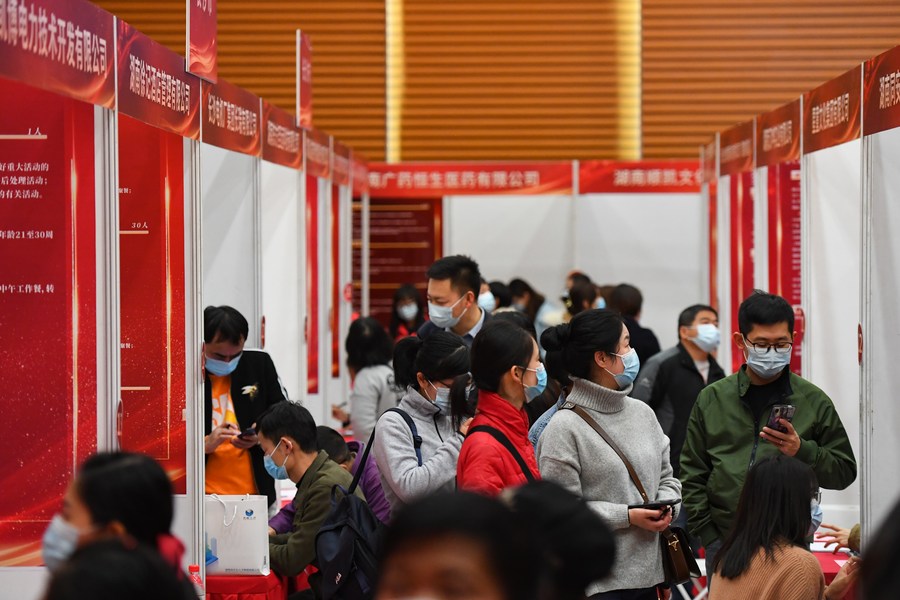


Photo taken on Feb. 18, 2021 shows a scene from a job fair at the Tianxin cultural industry park in Changsha, central China's Hunan Province. (Xinhua/Chen Zeguo)
DHAKA, March 15 (Xinhua) -- China has shown that a path to recovery entails a drive for direct job creation as gainful employment can bring a rise in income and keep the economy on track, a Bangladeshi scholar has said.
China has adopted a series of measures and policies, and constructed a whole set of systems covering policy, work and institution, Rashed Al Mahmud Titumir, chairman of Unnayan Onneshan, a think tank in Bangladesh, told Xinhua in a recent interview.
China has demonstrated that industry-driven poverty reduction brings employment, said Titumir, who holds a Ph.D. degree in Economics from the School of Oriental and African Studies at the University of London.
The COVID-19 crisis necessitates a new roadmap to salvage humanity, highlighting the importance of bringing a qualitative change in people's life in terms of good health, quality education, decent work, gender equality and strong institutions, he said.
The COVID-19 pandemic has had an unprecedented impact on people's livelihood in Bangladesh, with the emergence of new poor, unemployed and working poor, said Titumir, also a professor of Economics at Bangladesh's top Dhaka University.
China-Bangladesh relations can evolve to a partnership in production networks that create employment, particularly in the labor-intensive cottage industries, as well as micro, small and medium-sized enterprises, he added.
The partnership can start with textiles, textile-related goods and capital machinery, he said, adding that the next step can be in the fields of light engineering and assembling industries, covering smartphones, televisions, refrigerators, motorcycles and other home appliances.
Emphasis upon skill development and the improvement of labor productivity is therefore required to help develop the economy, said the professor, adding that China can be a partner in building educational institutions, including technical and vocational training centers in Bangladesh.
A universal social security program suitable to the life cycle of the public, involving children, mothers, the youth and the elderly, is urgently needed, he said, adding that the program has to be for everyone and should include income support, national health services and job seekers' allowances, among others.
"China has shown resilience in its recovery, and thus in order to avert a diverging K-shaped recovery path, a policy regime of active restraint, involving provision of public goods, and equitable distribution of resources are needed for a relatively equitable recovery," said Titumir.
"These would allow countries to move towards achieving sustainable development goals," the scholar added.

 Award-winning photos show poverty reduction achievements in NE China's Jilin province
Award-winning photos show poverty reduction achievements in NE China's Jilin province People dance to greet advent of New Year in Ameiqituo Town, Guizhou
People dance to greet advent of New Year in Ameiqituo Town, Guizhou Fire brigade in Shanghai holds group wedding
Fire brigade in Shanghai holds group wedding Tourists enjoy ice sculptures in Datan Town, north China
Tourists enjoy ice sculptures in Datan Town, north China Sunset scenery of Dayan Pagoda in Xi'an
Sunset scenery of Dayan Pagoda in Xi'an Tourists have fun at scenic spot in Nanlong Town, NW China
Tourists have fun at scenic spot in Nanlong Town, NW China Harbin attracts tourists by making best use of ice in winter
Harbin attracts tourists by making best use of ice in winter In pics: FIS Alpine Ski Women's World Cup Slalom
In pics: FIS Alpine Ski Women's World Cup Slalom Black-necked cranes rest at reservoir in Lhunzhub County, Lhasa
Black-necked cranes rest at reservoir in Lhunzhub County, Lhasa China's FAST telescope will be available to foreign scientists in April
China's FAST telescope will be available to foreign scientists in April